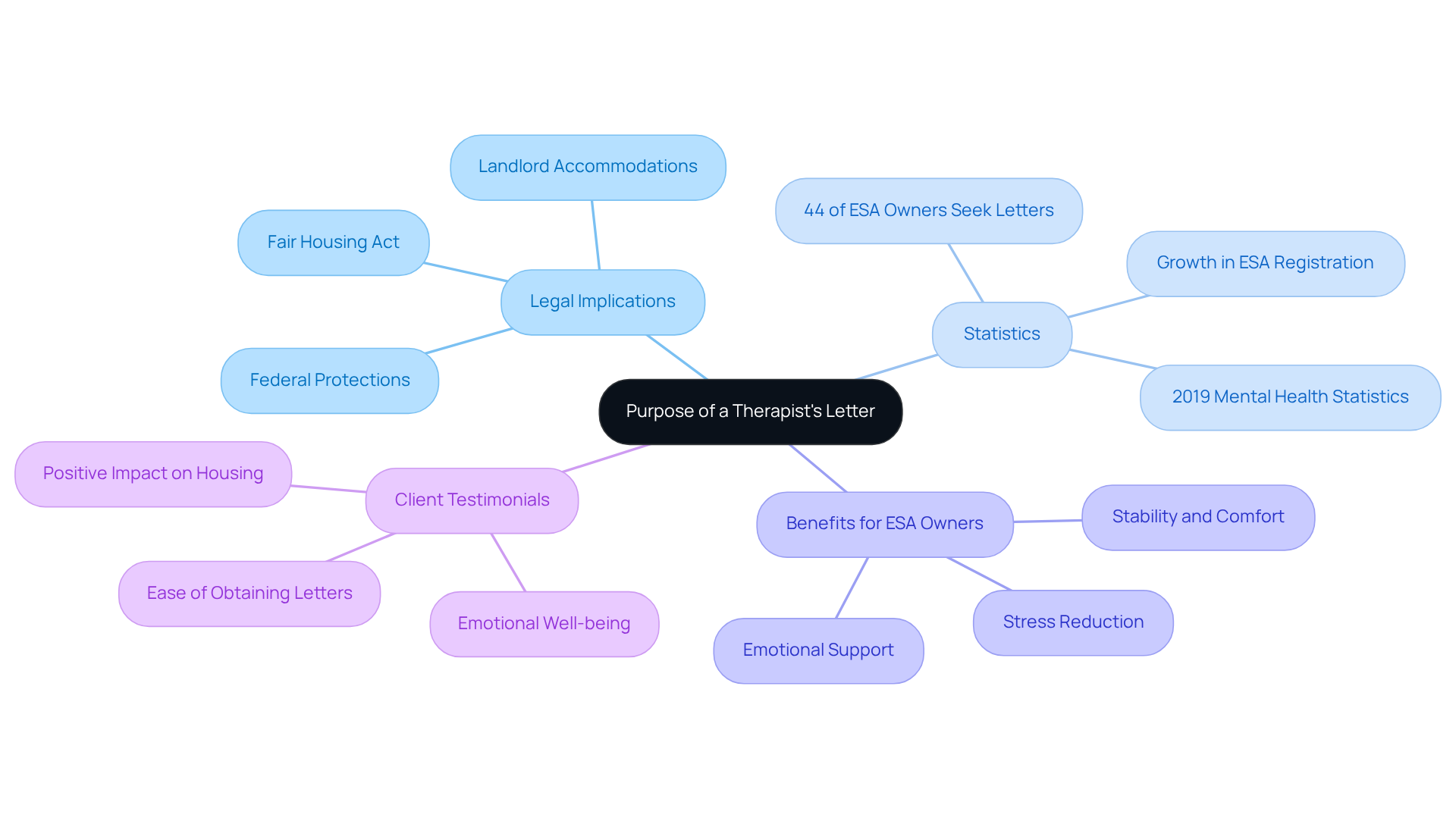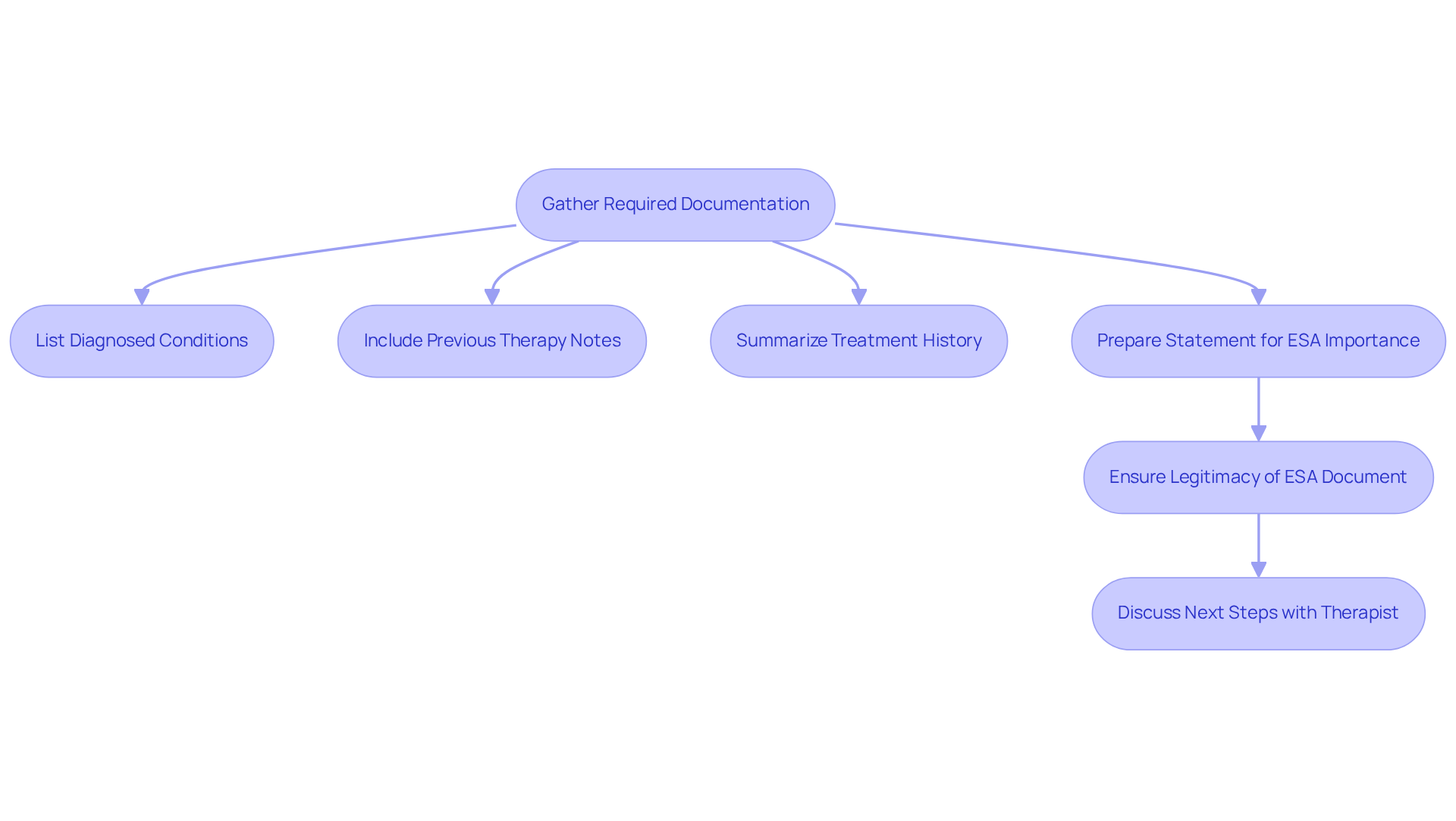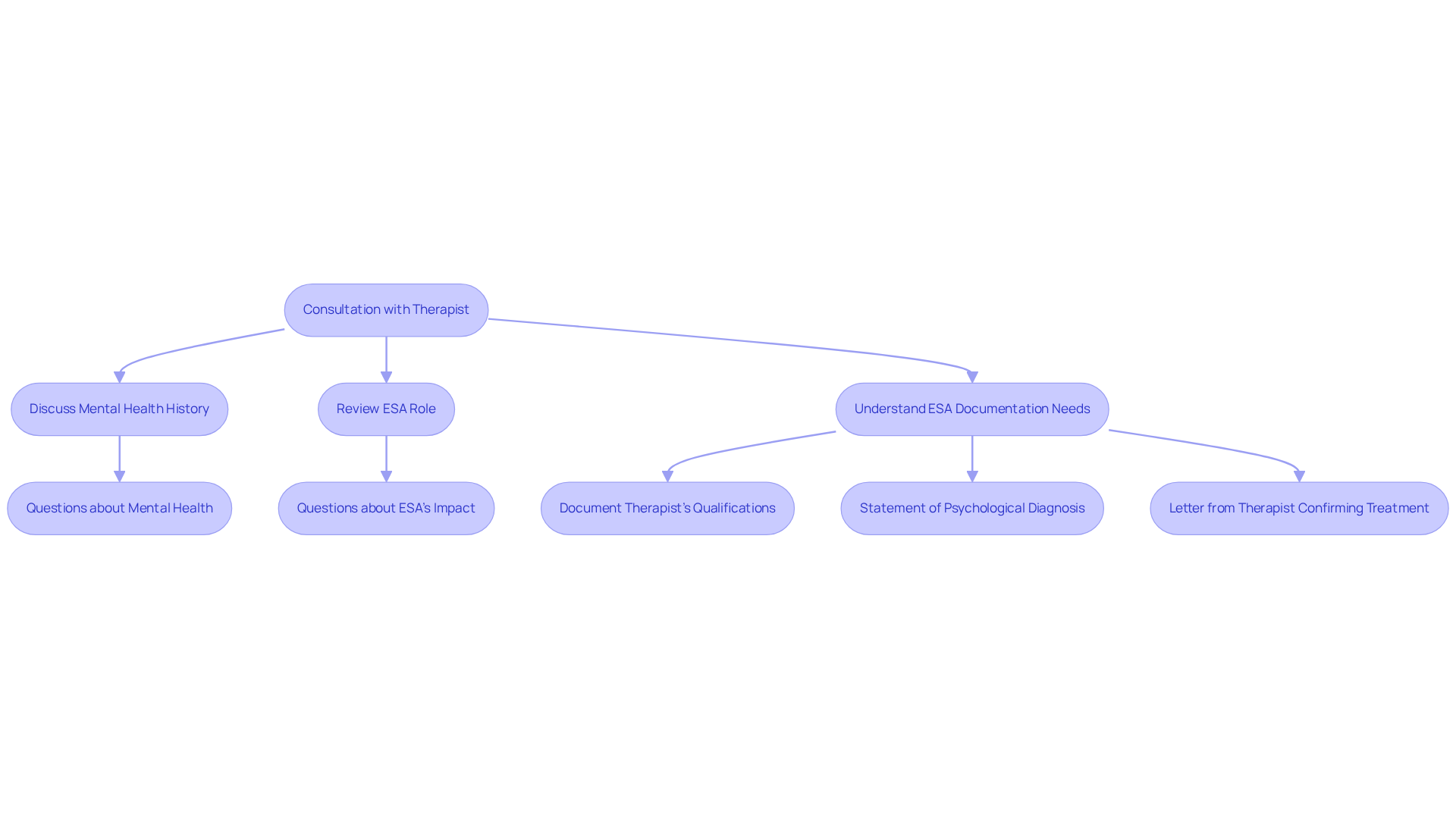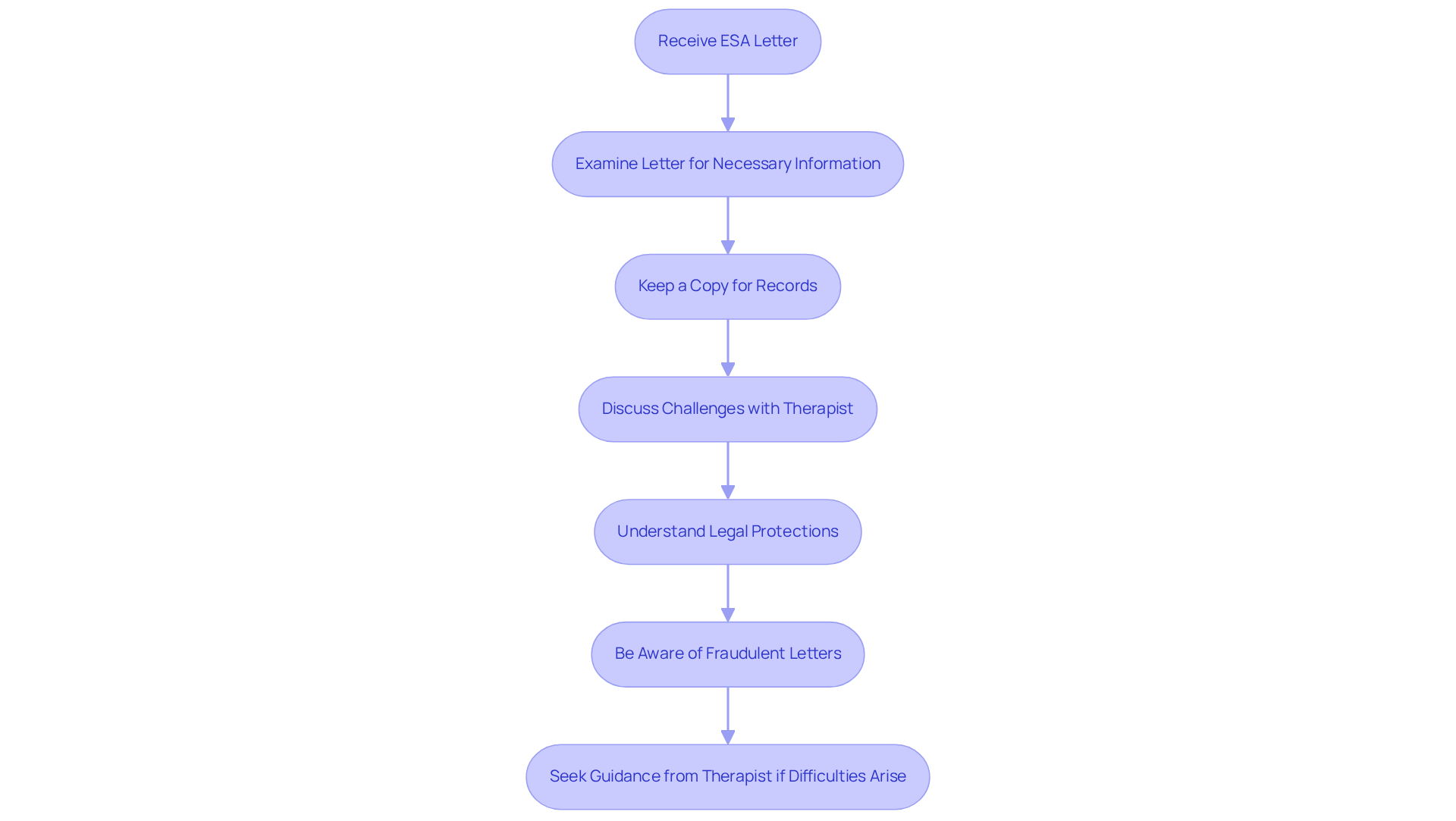

5 Steps to Obtain a Letter from Therapist Confirming Treatment
by Lena Park
Last updated: August 14, 2025
Verified and Approved by:
Angela Morris,
MSW, LCSW
Fact Checked

Overview
Navigating the complexities of mental health can be incredibly challenging, and for many, the journey toward healing often feels overwhelming. To obtain a letter from a therapist confirming treatment, individuals must engage in therapy with a licensed mental health professional. This professional can assess their psychological conditions and determine the necessity of an Emotional Support Animal (ESA).
It’s important to understand that preparing relevant documentation and being open during consultations are crucial steps in this process. These actions not only help ensure that the letter accurately reflects the individual’s needs but also facilitate their rights regarding housing and travel with their ESA.
Remember, you are not alone in this journey; support is available to help you every step of the way.
Introduction
For many individuals, securing a letter from a therapist that confirms their treatment can be a significant step toward gaining the emotional support of an animal in their lives. This essential documentation not only validates the need for an emotional support animal (ESA) but also serves as a vital tool in navigating housing restrictions and travel challenges.
Yet, the process can often feel overwhelming, leaving many to ponder: what specific steps are necessary to obtain this crucial letter, and how can one ensure it fulfills all required criteria? By exploring these questions, we can uncover a pathway toward greater emotional stability and legal protection, making it essential for those in need to fully understand this process.
Remember, you are not alone in this journey, and there is support available to help you every step of the way.
Understand the Purpose of a Therapist’s Letter
A letter from therapist confirming treatment plays a vital role in affirming your participation in therapy and underscores the significance of your emotional support animal (ESA) for your psychological well-being. This documentation is essential in various situations, especially when securing housing in pet-restricted environments and traveling with your ESA. Under the Fair Housing Act, landlords are required to accommodate ESA owners, allowing them to reside with their animals even in no-pets buildings. This legal support is crucial for individuals facing housing challenges due to their psychological conditions.
Many individuals with mental health issues may feel overwhelmed by the complexities of securing appropriate living arrangements. Statistics reveal that 44% of ESA owners have sought a letter from therapist confirming treatment from licensed mental health professionals, highlighting the significance of such documentation in overcoming housing and travel obstacles. An ESA document not only certifies the emotional support provided by the animal but also helps to alleviate anxiety and foster a sense of stability for those grappling with conditions such as PTSD and depression. As Darren Rafel, a licensed therapist with over ten years of experience, notes, “ESAs can offer comfort and companionship, which are essential in managing depression.”
Client testimonials further illustrate the positive impact of these letters, as many individuals have successfully obtained housing accommodations by presenting their letter from therapist confirming treatment, which affirms their need for emotional support. This process not only relieves stress but also nurtures a supportive living environment, which is crucial for mental well-being recovery. Additionally, Wellness Wag is dedicated to safeguarding your health information in compliance with HIPAA, ensuring that your personal details remain protected throughout this journey.
By understanding the purpose of a therapist’s note, you can effectively communicate your needs during therapy sessions, ensuring that the document accurately reflects your situation and requirements. Remember, you are not alone in this journey; there is support available to help you navigate these challenges.

Determine Eligibility for the Letter
If you’re feeling overwhelmed by your mental health challenges, you’re not alone. Many individuals experience emotional difficulties that can significantly affect their daily lives. To establish your eligibility for a letter from a therapist confirming treatment for an emotional support animal (ESA), it’s important to recognize that you must meet specific criteria.
Primarily, having a diagnosed psychological condition is essential. Common conditions include:
- Anxiety disorders, impacting approximately 31.9% of adolescents aged 13 to 18
- Depression
- Post-traumatic stress disorder (PTSD), which affects 7.7 million adults or 3.6% of the U.S. population
Engaging in therapy with a licensed psychological expert is vital, as they can evaluate your situation and provide the support you need. If you’re uncertain about your eligibility, consider reaching out to your therapist or mental health provider for a letter from a therapist confirming treatment. They can help clarify whether you meet the necessary criteria for an ESA document, ensuring that you receive the tailored support that fits your needs.
It’s important to remember that emotional support animals do not have the same legal rights and access to public spaces as service dogs under the ADA. While ESAs can offer comfort and help ease feelings of loneliness, stress, and anxiety, understanding these distinctions is crucial for navigating housing and travel regulations related to emotional support animals. You deserve the support that can make a difference in your life.

Gather Required Documentation and Prepare for Consultation
To truly enhance the effectiveness of your consultation for a letter from therapist confirming treatment, it’s essential to gather relevant documentation ahead of time. Start by creating a heartfelt list of your diagnosed psychological conditions, along with any previous therapy notes or evaluations that can provide context to your therapist. Additionally, take a moment to summarize your treatment history, highlighting any significant milestones or changes in your emotional journey.
Consider preparing a brief statement that explains why you believe an Emotional Support Animal is crucial for your emotional well-being. Research indicates that 88% of ESA owners acknowledge a positive effect on their well-being, underscoring the importance of obtaining an ESA document. Emotional Support Animals offer comfort and help alleviate symptoms associated with psychological or emotional disorders, which is especially vital for students seeking housing accommodations.
Moreover, during the COVID-19 pandemic, pet ownership was linked to improved psychological well-being, further reinforcing the therapeutic role of ESAs. This thoughtful preparation not only aids your therapist in understanding your needs but also encourages a more productive discussion during your appointment, particularly if you bring a letter from therapist confirming treatment.
Remember, ensuring the legitimacy of your ESA document is essential to prevent potential legal issues, particularly since ESAs do not possess the same legal rights and access to public spaces as service dogs. After your consultation, be ready to discuss the next steps, including any follow-up appointments or additional documentation your therapist may require. Your journey towards emotional support and healing is important, and you are not alone in this process.

Consult with Your Therapist: What to Expect
During your consultation, you will engage in a heartfelt discussion about your mental health history, current symptoms, and the significant role your Emotional Support Animal (ESA) plays in your treatment. Therapists typically ask specific questions to understand your needs and determine the suitability of providing an ESA document. For example, they may inquire about how your ESA alleviates symptoms of anxiety or depression and any specific moments when your pet has offered comfort. Carlos, a client, shared, “My dog Max helps me with my anxiety,” illustrating the deep personal connection many individuals have with their ESAs.
Being open and honest in your responses is vital, as this transparency allows your therapist to prepare a letter from therapist confirming treatment that accurately reflects your situation. It’s also beneficial to ask about the document’s contents, including any specific criteria it must meet for housing or travel purposes, like a letter from therapist confirming treatment. For instance, the document should include:
- The therapist’s qualifications
- A statement regarding your psychological diagnosis
- A letter from therapist confirming treatment for an ESA
Importantly, ESA letters provide legal recognition, allowing you to reside with your animal in housing where pets may not typically be permitted.
Research indicates that 62% of ESA owners experienced a positive change in their well-being during the pandemic, and those with ESAs at that time were over three times as likely to report an improvement in their well-being compared to those without. Furthermore, 73% of ESA owners rated their pet’s effectiveness in enhancing mental health as eight or higher on a scale of one to ten. This highlights the importance of discussing your ESA needs with your therapist, as they can offer valuable insights and support tailored to your unique circumstances.
As Linda S. expressed, “Applying for an ESA through Wellness Wag was the best decision I made. It was a seamless process, and the team was highly professional, showcasing the outstanding service and prompt approval that Wellness Wag provides for Emotional Support Animals.

Receive Your Letter and Next Steps
Upon receiving the letter from therapist confirming treatment, it is crucial to examine it thoroughly to ensure it contains all necessary information, including your therapist’s qualifications and contact details. This document, including the letter from therapist confirming treatment, is not just a formality; it is a vital tool in advocating for your rights regarding housing and travel with your Emotional Support Animal (ESA).
Keeping a copy for your records is wise, and it may be beneficial to discuss any potential challenges with your therapist. After all, approximately 88% of ESA owners report a positive impact on their mental health. Understanding the legal protections under the Fair Housing Act can empower you to assert your rights with confidence.
Should you encounter difficulties, your therapist can offer guidance on navigating housing policies or travel regulations effectively. Additionally, it is important to be vigilant against fraudulent ESA letters, as obtaining a letter from therapist confirming treatment is essential for protecting your rights.
At Wellness Wag, we are dedicated to safeguarding your Health Information in compliance with HIPAA, ensuring that your personal data is handled with the utmost care. Furthermore, recognizing the differences between ESAs and service dogs is vital; ESAs do not possess the same legal rights and access to public spaces as service dogs under the ADA.

Conclusion
Obtaining a letter from a therapist confirming treatment is a vital step for individuals seeking the support of an emotional support animal (ESA). This document not only validates the therapeutic relationship but also plays a crucial role in ensuring access to housing and travel accommodations where pets are typically restricted. Recognizing the importance of this letter empowers individuals to advocate for their mental health needs effectively.
The journey involves several key steps, beginning with:
- Determining eligibility based on diagnosed psychological conditions.
- Gathering necessary documentation.
- Preparing for a meaningful consultation with a therapist.
Engaging openly during the appointment allows for a comprehensive understanding of how an ESA contributes to emotional well-being, which is vital for receiving an accurate and supportive letter. The insights shared by clients and professionals alike highlight the profound impact that ESAs can have on mental health recovery.
In conclusion, navigating the path to obtain a therapist confirmation letter is a significant step toward enhancing emotional stability and well-being. By understanding the requirements and preparing adequately, individuals can access the support they need to thrive. It is essential to recognize the legal protections afforded under the Fair Housing Act and to remain vigilant against fraudulent practices. Taking proactive steps not only fosters a supportive living environment but also reinforces the importance of mental health in everyday life.
Frequently Asked Questions
What is the purpose of a therapist’s letter for an emotional support animal (ESA)?
A therapist’s letter confirms your participation in therapy and highlights the importance of your ESA for your psychological well-being. It is essential for securing housing in pet-restricted environments and for traveling with your ESA, as it provides legal support under the Fair Housing Act.
Who is required to accommodate ESA owners under the Fair Housing Act?
Landlords are required to accommodate ESA owners, allowing them to live with their animals even in buildings that typically do not allow pets.
What percentage of ESA owners have sought a letter from a therapist?
Statistics indicate that 44% of ESA owners have sought a letter from a licensed mental health professional confirming treatment.
What psychological conditions commonly qualify for an ESA letter?
Common conditions include anxiety disorders, depression, and post-traumatic stress disorder (PTSD).
Why is it important to engage in therapy with a licensed psychological expert?
Engaging in therapy is crucial as a licensed expert can evaluate your situation, provide necessary support, and determine your eligibility for an ESA letter.
Do emotional support animals have the same rights as service dogs?
No, emotional support animals do not have the same legal rights and access to public spaces as service dogs under the Americans with Disabilities Act (ADA).
How can a therapist’s letter alleviate stress for individuals with mental health challenges?
A therapist’s letter can help individuals obtain housing accommodations, which relieves stress and fosters a supportive living environment essential for mental well-being recovery.
What should you do if you’re unsure about your eligibility for an ESA letter?
If you’re uncertain about your eligibility, consider reaching out to your therapist or mental health provider to clarify whether you meet the necessary criteria for an ESA document.
Certify Your Emotional Support Animal Today

Why You Can Rely on Us?
At Wellness Wag, we believe your pet deserves care rooted in both science and compassion. Each article is carefully researched, written in clear language for pet owners, and then reviewed by qualified professionals to ensure the information is evidence-based, current, and practical for real-life care. Our goal is to help you feel confident in making informed decisions about your pet’s health and well-being.
Reviewed by
Angela Morris, MSW, LCSW
Angela is a licensed clinical social worker with 20 years of experience in patient advocacy and community mental health. She has assisted numerous clients with ESA evaluations and brings a deep understanding of disability accommodations, ensuring that all information is accurate, supportive, and practical.

Written by :
Lena Park
Last Updated :
August 14, 2025









